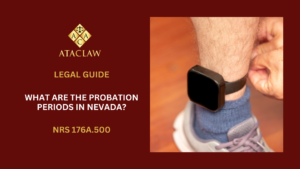Have you ever wondered about the probation periods for different offenses in Nevada? In this comprehensive blog post, we will delve into the specifics of probation durations for various crimes, as outlined in Nevada Revised Statute 176A.500.

Probation Periods for Different Offenses
- Gross Misdemeanors: How long does probation last for a gross misdemeanor? A gross misdemeanor carries a probation period of up to twelve months. This category includes offenses such as reckless driving, domestic violence, and certain drug-related crimes.
- Category E Felonies: What is the probation period for a category E felony? For category E felonies, the probation period can extend up to eighteen months. Crimes in this category may include burglary, possession of a controlled substance with intent to distribute, and non-serious sexual offenses.
- Category D and C Felonies: What is the probation period for category D and C felonies? Both category D and C felonies have a probation period of up to twenty-four months. Offenses in this category range from grand theft and identity theft to some drug trafficking charges.
- Category B Felonies: How long does probation last for a category B felony? Category B felonies carry the longest probation period, which can be up to thirty-six months. This category includes crimes such as voluntary manslaughter, residential burglary, and possession of a controlled substance for sale.
- Child Abuse and Certain Violent or Sexual Offenses: What is the probation period for child abuse, violent crimes, and sexual offenses? Offenses such as child abuse, violent crimes, or sexual offenses have an extended probation period of up to sixty months. This includes crimes such as rape, lewdness with a minor, and certain acts of domestic violence.
What deductions can be made for a successful completion of probation?
During probation, defendants can earn deductions from their probation sentence for each month successfully served. These deductions are provided as incentives for defendants to adhere to probation conditions and actively participate in their rehabilitation and reintegration into society. The following deductions can be made:
- Compliance with Fees and Restitution: To what extent can compliance with fees and restitution lead to deductions? A deduction of ten days can be made for each month the person serves and is current with any fee charged for supervision by the Division of Parole and Probation of the Department of Public Safety. Additionally, compliance with court-ordered restitution payments, including any payments required under NRS 176A.430, can also contribute to the deduction.
- Employment or Program Involvement: How does employment or program involvement affect probation deductions? Another deduction of ten days can be made for each month the person serves while actively involved in employment or enrolled in an approved program of education, rehabilitation, or any other program approved by the Division. This deduction applies regardless of whether the person has satisfied the requirements for fees and restitution.
Understanding Nevada’s probation periods is crucial for both defendants and legal professionals. By being aware of the maximum length of probation for specific offenses, individuals can make well-informed decisions and plan for their future.
